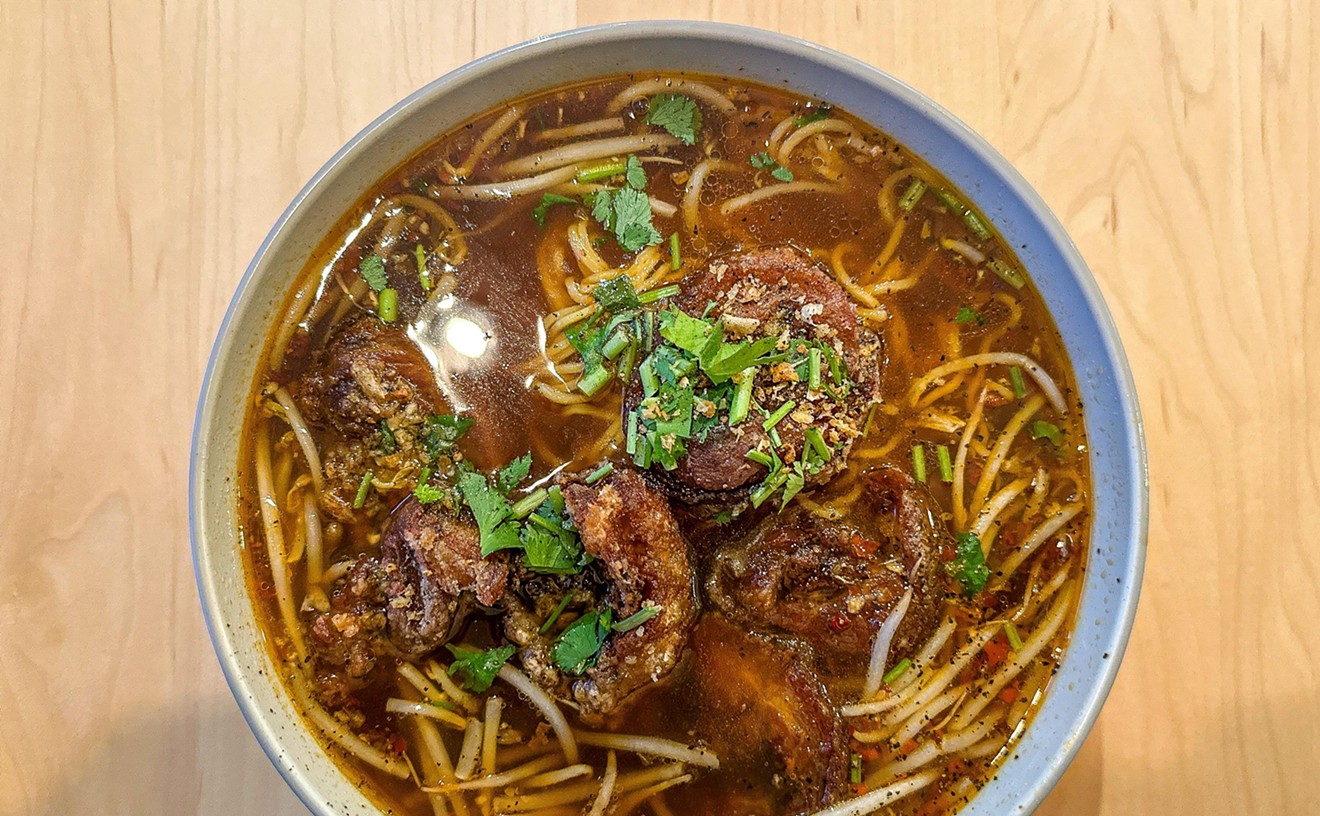This East African exotica is not new to Dallas. Ethiopian restaurants have popped onto and dropped off the North Texas landscape for some 20 years, with names such as River Nile, Ghion, Abyssinia and the defunct but not forgotten Queen of Sheba, perhaps the best of the lot. Yet it's still an enigmatic form of dining to the great horde of Dallas diners weaned on steak and burritos and French fries.
Dining at Lalibela Restaurant & Bar will do little to dispel the mysteries that envelop Ethiopian feasting. Instead, the restaurant seems to work overtime making this cuisine as cryptic as possible.
Lalibela is tucked in a nondescript strip mall on Forest Lane. Despite the daily midnight closing hour, the restaurant serves no alcohol. It's still waiting for the gods from the Texas Alcoholic Beverage Commission to bless it with a liquor license, according to a server. Drinks that you can't have are even listed on the menu, including a healthy roster of imported and domestic beers and tej, an Ethiopian wine made of honey.
Unfortunately, there are many other things you can't have that are listed on the menu, but this has nothing to do with a liquor license. It seems the kitchen has a habit of running out of stuff. On one visit, Lalibela was out of appetizers: sambusa, an Ethiopian stuffed pastry; and buffalo wings. Buffalo wings? In a peculiar nod to the middle-of-the-road risk-adverse, Lalibela offers grilled chicken sandwiches, double cheeseburgers and French fries. And no doubt those buffalo wings will appear in the flesh as soon as the liquor license gets posted.
Lalibela was also out of most of the sides listed on the menu as well as fish. What they did have was a vegetarian platter carpeted with injera and dotted with dabs of food in a palette-like array of bright colors. Yet because of either language barriers or indolence, it proved impossible to get any information from the servers either in the form of dish descriptions or a summary of ingredients. Here you are on your own.
Which doesn't necessarily create an infeasible situation. By cross-referencing information gleaned from your tongue and the menu, it's possible to unravel the food group origins of each dab. The spicy yemesir wat (lentils cooked in pepper sauce) is smooth and pungent while the tamer ater kik (yellow split peas cooked in spices) is sallow, milder and hearty. Bright reddish-purple beets are sweet and edged with a terse tang. There's even a take on some Southern cooking with gomen, collard greens sautéed with onion, garlic, ginger and other spices. An unidentified flaxen-hued blend of potatoes, carrots and spices was pocked with hard and undercooked potato wedges, while the tomato salad, a dish that was requested on each of our visits but only made it to our table once, was riddled with hard, under-ripe tomatoes.
Lalibela meat dishes tend to be well-seasoned and gaudily sauced. Dor wat, a "famous" Ethiopian dish of chicken cooked in spices and a dark orange sauce, features a whole chicken leg and a whole hard-boiled egg that is an unrecognizable bump resembling a gravy-stained baked potato. The chicken was mostly dry, though the sauce was heady and intense, almost making up for the meat's desiccation.
Yebeg tibis, small cuts of "boneless" lamb stir-fried with onions, was tough and gristly. Plus, it harbored large fragments of sharp, shattered bone, making chewing hard on the teeth and gums. Despite the meaty opulence of these other meat selections, an unidentified beef dish in a dark ruddy sauce had only two strips of beef sown into its depths.
There isn't much to this white, strip-mall compartment with thickly shellacked wooden tables and Ethiopian artifacts and ephemera cluttering the walls. Strings of beads hang in the windows, helping the blinds handle their shielding duties.
The menu makes reference to a traditional coffee ceremony Lalibela hosts every Sunday, noting that coffee was discovered after an Ethiopian shepherd noticed his goats' friskiness after chewing bright red coffee beans.
But Lalibela is a difficult entrée into Ethiopian exotica, even with little stories on the menu. Service is laggard, the menu inscrutable (on account of all of the outages), and no one on staff seems compelled to fill the gaps. To dine here you have to feel your way through with your digits and a host of tight thumb and forefinger pinches. And don't forget to ask for napkins. Wiping your face with a sheet of injera doesn't work so well.










